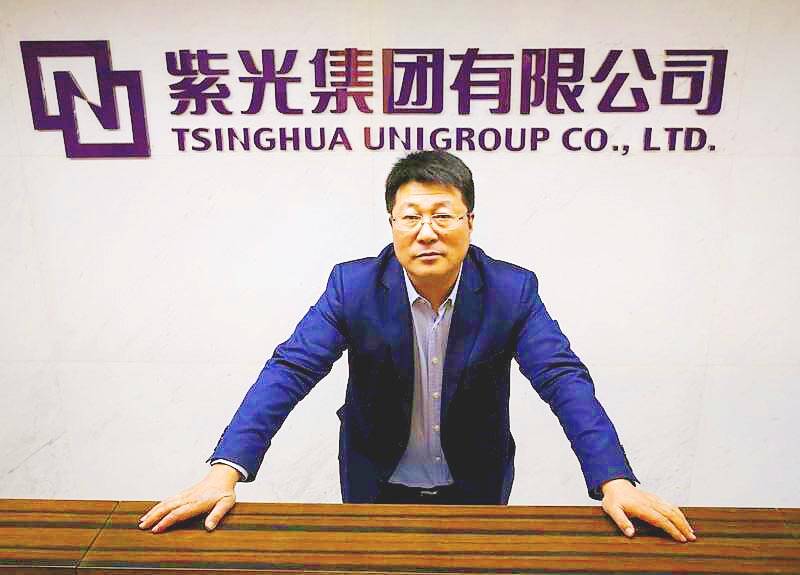China has charged the former chairman of chip conglomerate Tsinghua Unigroup Co (清華紫光), Zhao Weiguo (趙偉國), with crimes including corruption and illegally earning profits for his friends and family, the country’s anti-graft watchdog said in a statement yesterday.
Zhao is alleged to have handed profitable businesses to his relatives and friends to operate and purchased goods from units managed by his associates at prices higher than the market rate, the Chinese Central Commission for Discipline Inspection said.
The acts caused heavy losses to national interests, it said.

Photo: Reuters
Originating as a branch of China’s prestigious Tsinghua University, state-backed Tsinghua Unigroup emerged in the previous decade as a would-be domestic champion for China’s laggard semiconductor industry.
However, the company racked up immense debt under Zhao. It spent heavily on chip-related acquisitions, but also on unrelated, unprofitable businesses ranging from real estate to online gambling that eventually led it to default on a number of bond payments in late 2020 and face bankruptcy.
Tsinghua Unigroup last year completed a restructuring plan that placed it under the ownership of a vehicle controlled by Wise Road Capital Ltd (智路資本), Jianguang Asset Management Co (北京建廣資本) and a number of state-affiliated funds. Zhao was replaced by Li Bin (李濱) in July last year.
Financial magazine Caixin reported in the same month that Zhao had been taken away from his home Beijing by authorities and had since been out of contact.
Zhao is among the more prominent names swept up in a recent flurry of graft probes, reflecting how China’s top leadership has grown increasingly frustrated with a years-long failure to develop chips that can replace US circuitry.
The investigations sent shockwaves through an industry long accustomed to top-level support. Beijing had allocated more than US$100 billion to build up a domestic chip sector so the country could break its dependence on the West.
Additional reporting by Bloomberg

Taiwan Semiconductor Manufacturing Co (TSMC, 台積電) last week recorded an increase in the number of shareholders to the highest in almost eight months, despite its share price falling 3.38 percent from the previous week, Taiwan Stock Exchange data released on Saturday showed. As of Friday, TSMC had 1.88 million shareholders, the most since the week of April 25 and an increase of 31,870 from the previous week, the data showed. The number of shareholders jumped despite a drop of NT$50 (US$1.59), or 3.38 percent, in TSMC’s share price from a week earlier to NT$1,430, as investors took profits from their earlier gains

In a high-security Shenzhen laboratory, Chinese scientists have built what Washington has spent years trying to prevent: a prototype of a machine capable of producing the cutting-edge semiconductor chips that power artificial intelligence (AI), smartphones and weapons central to Western military dominance, Reuters has learned. Completed early this year and undergoing testing, the prototype fills nearly an entire factory floor. It was built by a team of former engineers from Dutch semiconductor giant ASML who reverse-engineered the company’s extreme ultraviolet lithography (EUV) machines, according to two people with knowledge of the project. EUV machines sit at the heart of a technological Cold

Taiwan’s long-term economic competitiveness will hinge not only on national champions like Taiwan Semiconductor Manufacturing Co. (TSMC, 台積電) but also on the widespread adoption of artificial intelligence (AI) and other emerging technologies, a US-based scholar has said. At a lecture in Taipei on Tuesday, Jeffrey Ding, assistant professor of political science at the George Washington University and author of "Technology and the Rise of Great Powers," argued that historical experience shows that general-purpose technologies (GPTs) — such as electricity, computers and now AI — shape long-term economic advantages through their diffusion across the broader economy. "What really matters is not who pioneers

TAIWAN VALUE CHAIN: Foxtron is to fully own Luxgen following the transaction and it plans to launch a new electric model, the Foxtron Bria, in Taiwan next year Yulon Motor Co (裕隆汽車) yesterday said that its board of directors approved the disposal of its electric vehicle (EV) unit, Luxgen Motor Co (納智捷汽車), to Foxtron Vehicle Technologies Co (鴻華先進) for NT$787.6 million (US$24.98 million). Foxtron, a half-half joint venture between Yulon affiliate Hua-Chuang Automobile Information Technical Center Co (華創車電) and Hon Hai Precision Industry Co (鴻海精密), expects to wrap up the deal in the first quarter of next year. Foxtron would fully own Luxgen following the transaction, including five car distributing companies, outlets and all employees. The deal is subject to the approval of the Fair Trade Commission, Foxtron said. “Foxtron will be